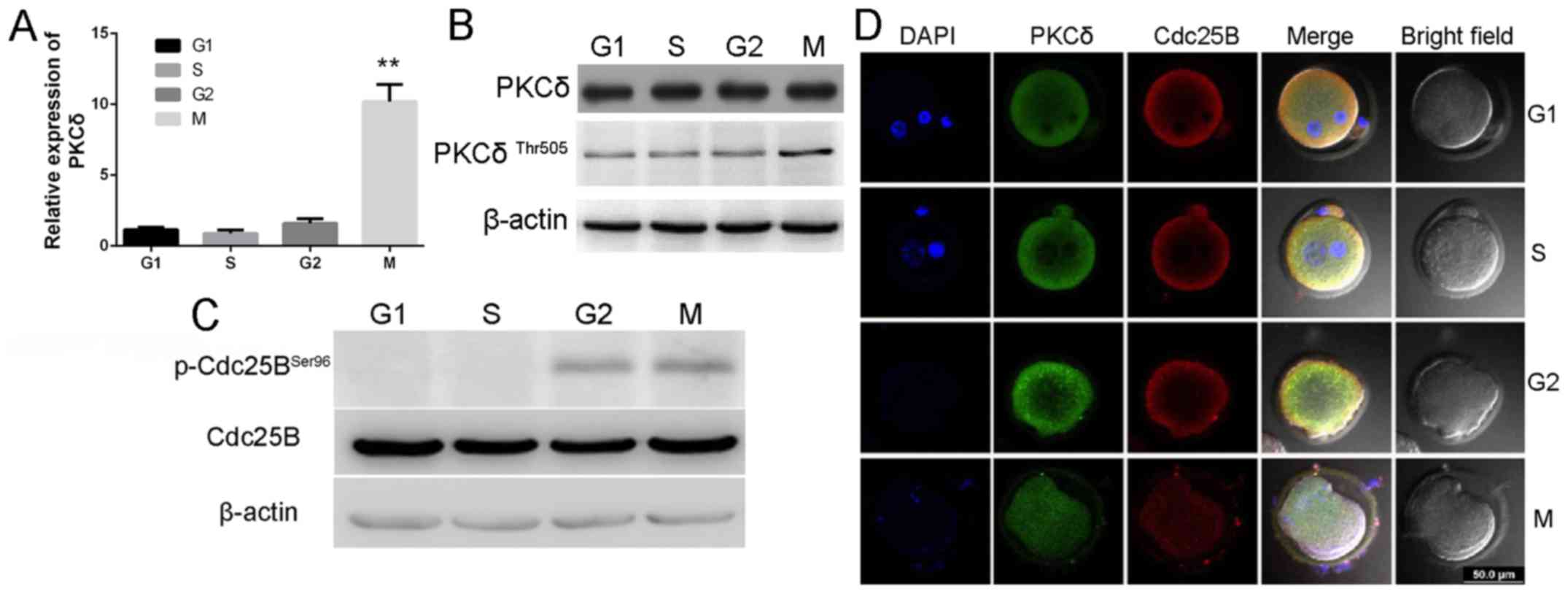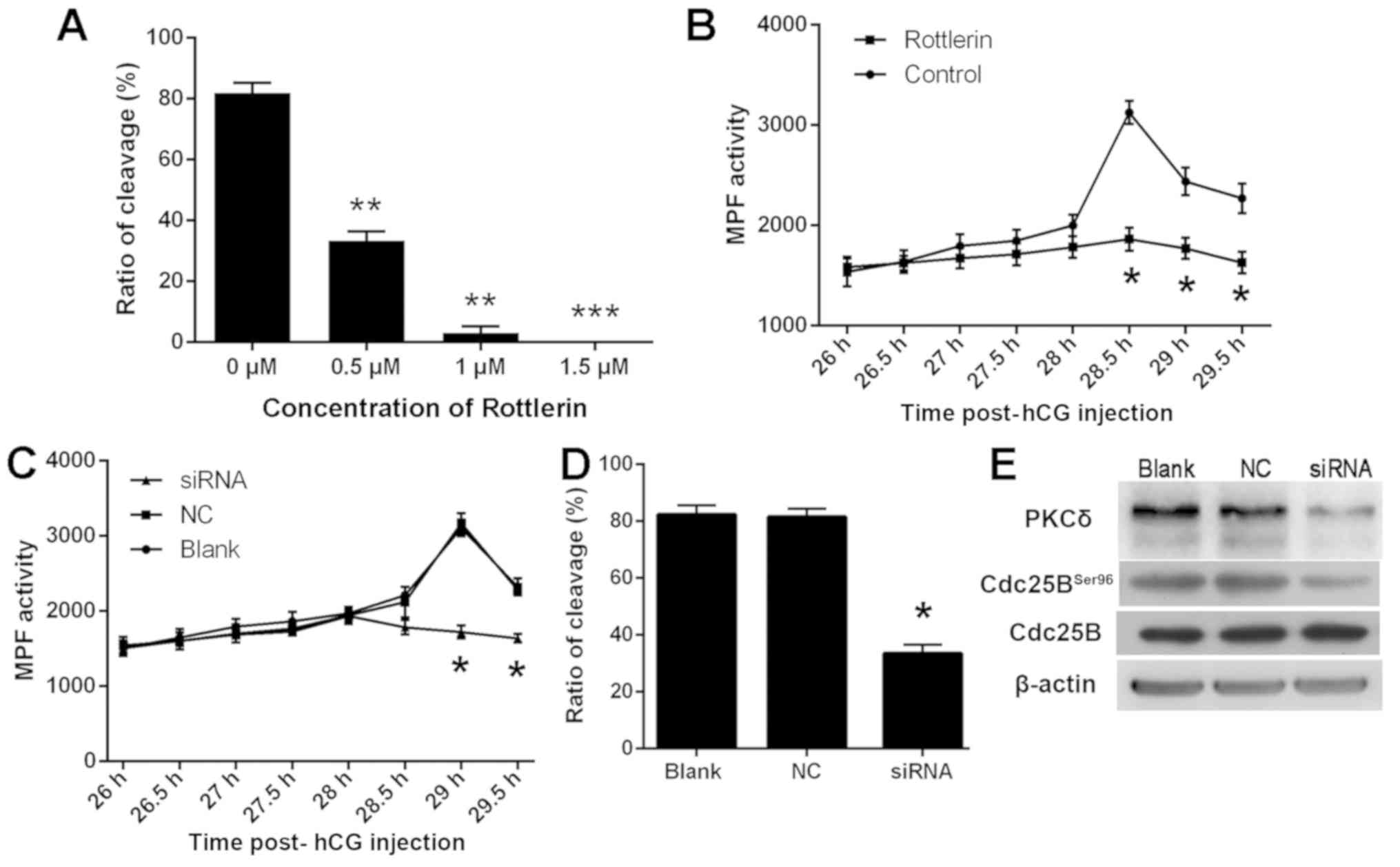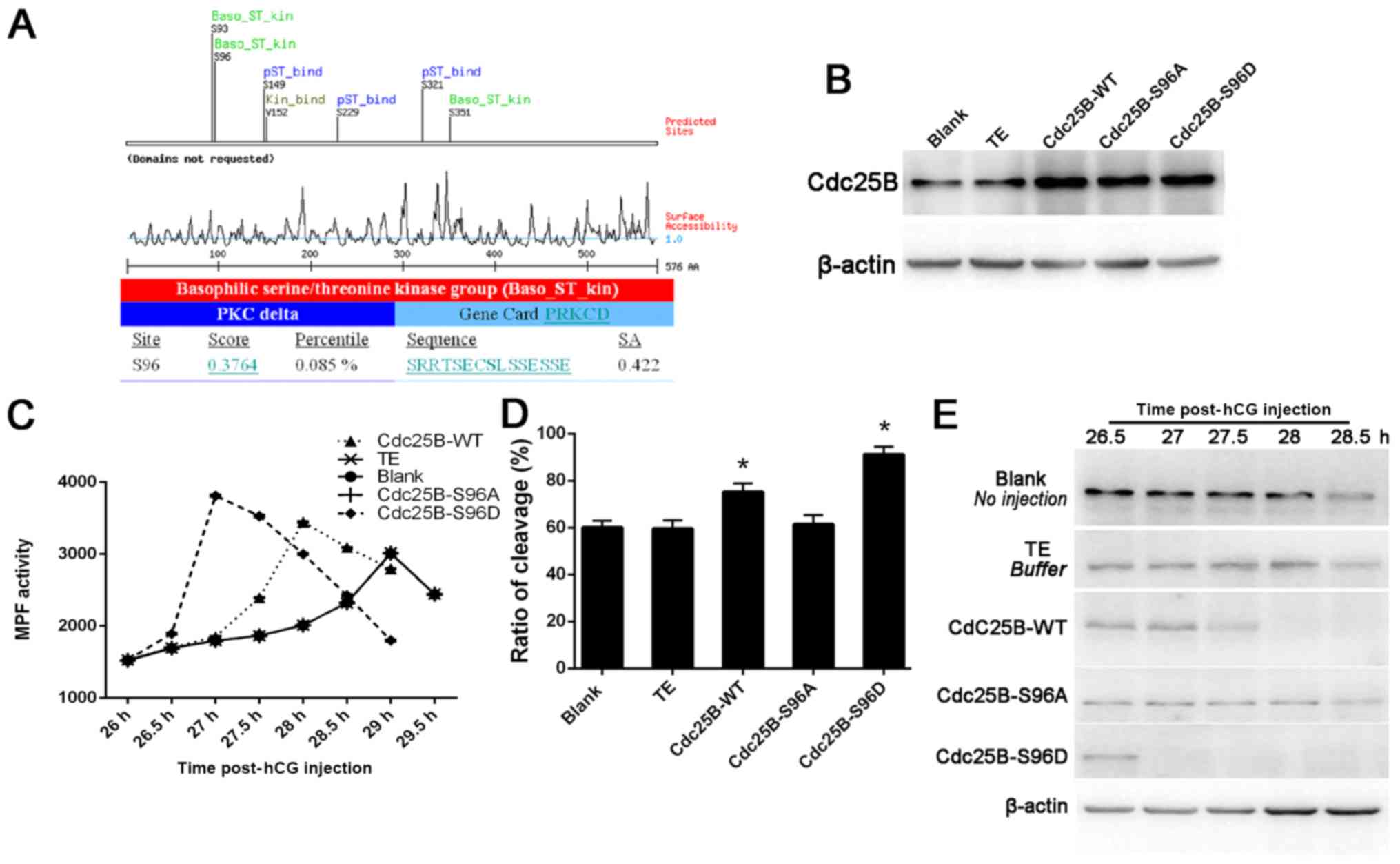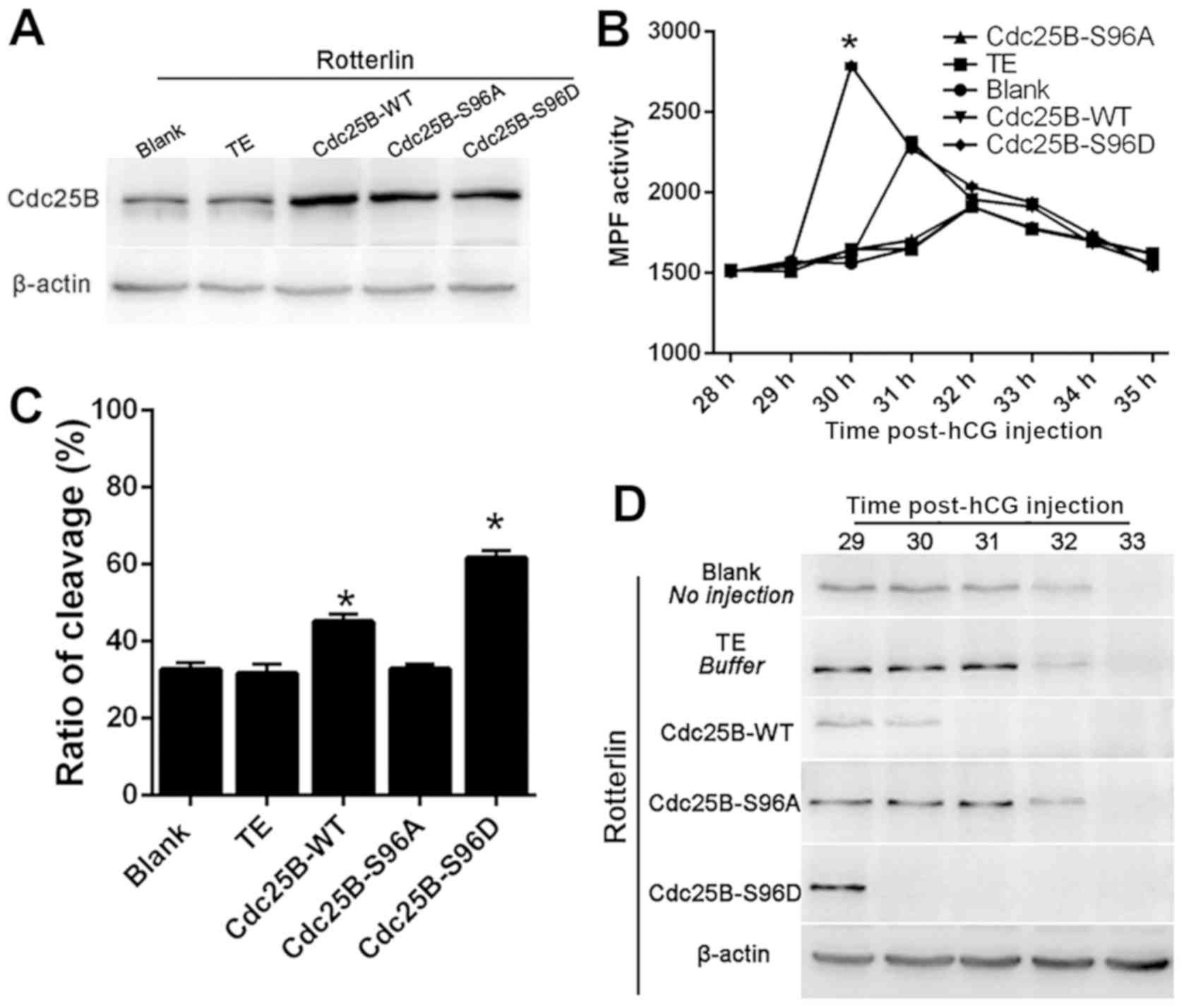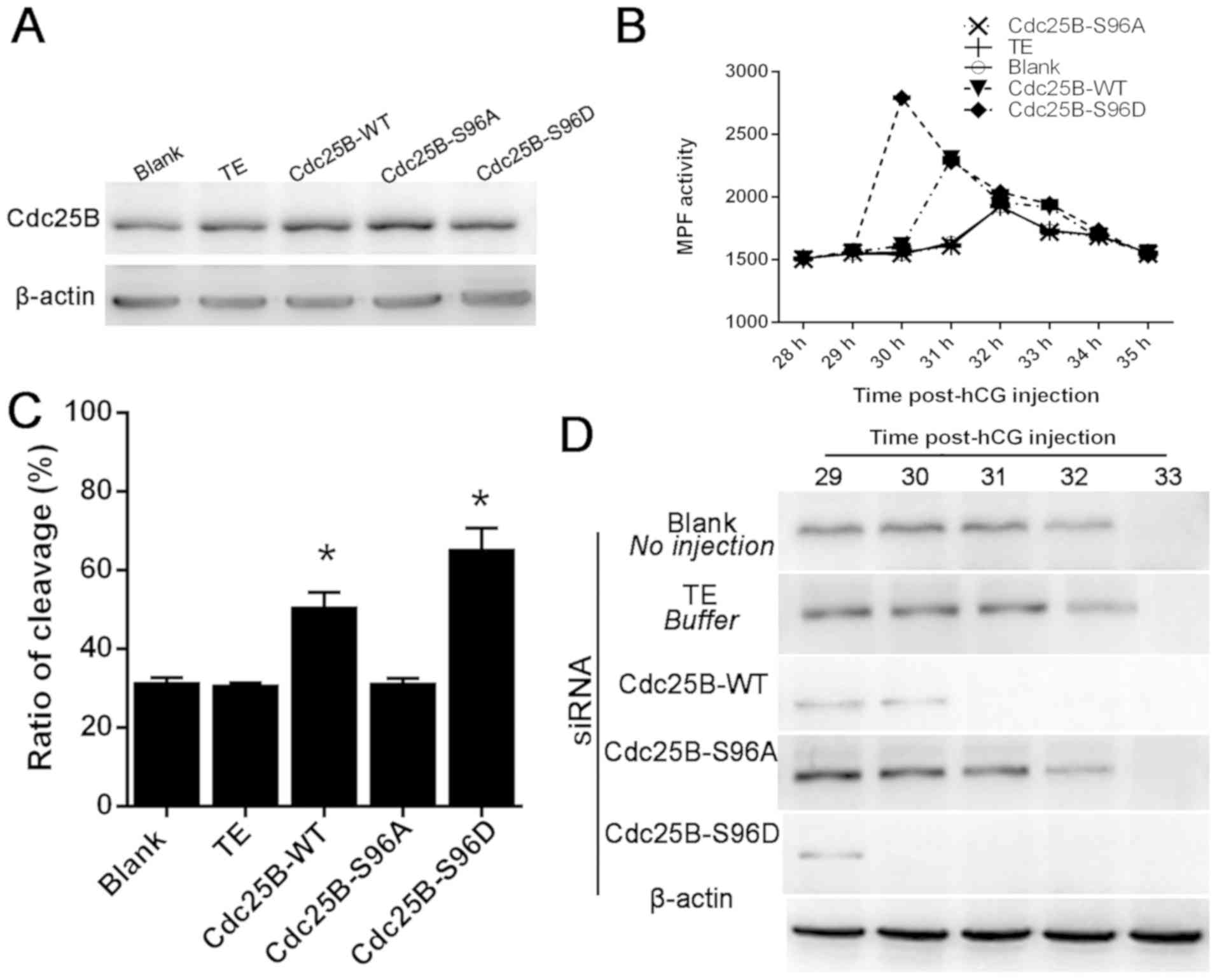|
1
|
Mochly-Rosen D, Das K and Grimes KV:
Protein kinase C, an elusive therapeutic target? Nat Rev Drug
Discov. 11:937–957. 2012. View
Article : Google Scholar : PubMed/NCBI
|
|
2
|
Plusa B, Frankenberg S, Chalmers A,
Hadjantonakis AK, Moore CA, Papalopulu N, Papaioannou VE, Glover DM
and Zernicka-Goetz M: Downregulation of Par3 and aPKC function
directs cells towards the ICM in the preimplantation mouse embryo.
J Cell Sci. 118:505–515. 2005. View Article : Google Scholar : PubMed/NCBI
|
|
3
|
Downs SM, Cottom J and Hunzicker-Dunn M:
Protein kinase C and meiotic regulation in isolated mouse oocytes.
Mol Reprod Dev. 58:101–115. 2001. View Article : Google Scholar : PubMed/NCBI
|
|
4
|
Viveiros MM, Hirao Y and Eppig JJ:
Evidence that protein kinase C (PKC) participates in the meiosis I
to meiosis II transition in mouse oocytes. Dev Biol. 235:330–342.
2001. View Article : Google Scholar : PubMed/NCBI
|
|
5
|
Ma W, Baumann C and Viveiros MM: Lack of
protein kinase C-delta (PKCdelta) disrupts fertilization and
embryonic development. Mol Reprod Dev. 82:797–808. 2015. View Article : Google Scholar : PubMed/NCBI
|
|
6
|
Kalive M, Faust JJ, Koeneman BA and Capco
DG: Involvement of the PKC family in regulation of early
development. Mol Reprod Dev. 77:95–104. 2010.PubMed/NCBI
|
|
7
|
Ouaret D and Larsen AK: Protein kinase C
beta inhibition by enzastaurin leads to mitotic missegregation and
preferential cytotoxicity toward colorectal cancer cells with
chromosomal instability (CIN). Cell Cycle. 13:2697–2706. 2014.
View Article : Google Scholar : PubMed/NCBI
|
|
8
|
Poli A, Mongiorgi S, Cocco L and Follo MY:
Protein kinase C involvement in cell cycle modulation. Biochem Soc
Trans. 42:1471–1476. 2014. View Article : Google Scholar : PubMed/NCBI
|
|
9
|
Poli A, Ramazzotti G, Matteucci A, Manzoli
L, Lonetti A, Suh PG, McCubrey JA and Cocco L: A novel
DAG-dependent mechanism links PKCa and Cyclin B1 regulating cell
cycle progression. Oncotarget. 5:11526–11540. 2014. View Article : Google Scholar : PubMed/NCBI
|
|
10
|
Shen Y, Sherman JW, Chen X and Wang R:
Phosphorylation of Cdc25C by AMP-activated protein kinase mediates
a metabolic checkpoint during cell cycle G2/M phase transition. J
Biol Chem. 293:5185–5199. 2018. View Article : Google Scholar : PubMed/NCBI
|
|
11
|
Weimer AK, Biedermann S and Schnittger A:
Specialization of CDK regulation under DNA damage. Cell Cycle.
16:143–144. 2017. View Article : Google Scholar : PubMed/NCBI
|
|
12
|
Kishimoto T: MPF-based meiotic cell cycle
control: Half a century of lessons from starfish oocytes. Proc Jpn
Acad Ser B Phys Biol Sci. 94:180–203. 2018. View Article : Google Scholar : PubMed/NCBI
|
|
13
|
Gaffré M, Martoriati A, Belhachemi N,
Chambon JP, Houliston E, Jessus C and Karaiskou A: A critical
balance between Cyclin B synthesis and Myt1 activity controls
meiosis entry in Xenopus oocytes. Development. 138:3735–3744. 2011.
View Article : Google Scholar : PubMed/NCBI
|
|
14
|
Mueller PR, Coleman TR, Kumagai A and
Dunphy WG: Myt1: A membrane-associated inhibitory kinase that
phosphorylates Cdc2 on both threonine-14 and tyrosine-15. Science.
270:86–90. 1995. View Article : Google Scholar : PubMed/NCBI
|
|
15
|
Perdiguero E and Nebreda AR: Regulation of
Cdc25C activity during the meiotic G2/M transition. Cell Cycle.
3:733–737. 2004. View Article : Google Scholar : PubMed/NCBI
|
|
16
|
Tiwari M, Gupta A, Sharma A, Prasad S,
Pandey AN, Yadav PK, Pandey AK, Shrivastav TG and Chaube SK: Role
of mitogen activated protein kinase and maturation promoting factor
during the achievement of meiotic competency in mammalian oocytes.
J Cell Biochem. 119:123–129. 2018. View Article : Google Scholar : PubMed/NCBI
|
|
17
|
Shi X, Fu W, Zhao Y, Liu Y, Liu Y, Zong Z
and YU B: The effects of PKC on the activation of cdc2 and cdc25 in
one cell stage fertilized mouse eggs. Chin J Biochem Mol Biol.
18:746–749. 2002.
|
|
18
|
Liu Y, et al: The regulation of PKC in
fertilized mouse eggs. Chin J Biochem Mol Biol. 25:619–624.
2000.(In Chinese).
|
|
19
|
Siefert JC, Clowdus EA and Sansam CL: Cell
cycle control in the early embryonic development of aquatic animal
species. Comp Biochem Physiol C Toxicol Pharmacol. 178:8–15. 2015.
View Article : Google Scholar : PubMed/NCBI
|
|
20
|
Yu BZ, Zheng J, Yu AM, Shi XY, Liu Y, Wu
DD, Fu W and Yang J: Effects of protein kinase C on M-phase
promoting factor in early development of fertilized mouse eggs.
Cell Biochem Funct. 22:291–298. 2004. View Article : Google Scholar : PubMed/NCBI
|
|
21
|
Gonzalez-Garcia JR, Machaty Z, Lai FA and
Swann K: The dynamics of PKC-induced phosphorylation triggered by
Ca2+ oscillations in mouse eggs. J Cell Physiol. 228:110–119. 2013.
View Article : Google Scholar : PubMed/NCBI
|
|
22
|
Zhang Z, Su WH, Feng C, Yu DH, Cui C, Xu
XY and Yu BZ: Polo-like kinase 1 may regulate G2/M transition of
mouse fertilized eggs by means of inhibiting the phosphorylation of
Tyr15 of Cdc2. Mol Reprod Dev. 74:1247–1254. 2007. View Article : Google Scholar : PubMed/NCBI
|
|
23
|
Livak KJ and Schmittgen TD: Analysis of
relative gene expression data using real-time quantitative PCR and
the 2(-Delta Delta C(T)) method. Methods. 25:402–408. 2001.
View Article : Google Scholar : PubMed/NCBI
|
|
24
|
Gschwendt M, Müller HJ, Kielbassa K, Zang
R, Kittstein W, Rincke G and Marks F: Rottlerin, a novel protein
kinase inhibitor. Biochem Biophys Res Commun. 199:93–98. 1994.
View Article : Google Scholar : PubMed/NCBI
|
|
25
|
Soltoff SP: Rottlerin: An inappropriate
and ineffective inhibitor of PKCdelta. Trends Pharmacol Sci.
28:453–458. 2007. View Article : Google Scholar : PubMed/NCBI
|
|
26
|
Cui C, Zhao H, Zhang Z, Zong Z, Feng C,
Zhang Y, Deng X, Xu X and Yu B: CDC25B acts as a potential target
of PRKACA in fertilized mouse eggs. Biol Reprod. 79:991–998. 2008.
View Article : Google Scholar : PubMed/NCBI
|
|
27
|
Ferreira TA, Blackman AV, Oyrer J, Jayabal
S, Chung AJ, Watt AJ, Sjöström PJ and van Meyel DJ: Neuronal
morphometry directly from bitmap images. Nat Methods. 11:982–984.
2014. View Article : Google Scholar : PubMed/NCBI
|
|
28
|
Xiao J, Liu C, Hou J, Cui C, Wu D, Fan H,
Sun X, Meng J, Yang F, Wang E and Yu B: Ser149 is another potential
PKA phosphorylation target of Cdc25B in G2/M transition of
fertilized mouse eggs. J Biol Chem. 286:10356–10366. 2011.
View Article : Google Scholar : PubMed/NCBI
|
|
29
|
Xu XY, Zhang Z, Su WH, Zhang Y, Yu YQ, Li
YX, Zong ZH and Yu BZ: Characterization of p70 S6 kinase 1 in early
development of mouse embryos. Dev Dyn. 238:3025–3034. 2009.
View Article : Google Scholar : PubMed/NCBI
|
|
30
|
Cohen EE, Zhu H, Lingen MW, Martin LE, Kuo
WL, Choi EA, Kocherginsky M, Parker JS, Chung CH and Rosner MR: A
feed-forward loop involving protein kinase Calpha and microRNAs
regulates tumor cell cycle. Cancer Res. 69:65–74. 2009. View Article : Google Scholar : PubMed/NCBI
|
|
31
|
Zhou X, Quann E and Gallicano GI:
Differentiation of nonbeating embryonic stem cells into beating
cardiomyocytes is dependent on downregulation of PKC beta and zeta
in concert with upregulation of PKC epsilon. Dev Biol. 255:407–422.
2003. View Article : Google Scholar : PubMed/NCBI
|
|
32
|
Tatone C, Delle Monache S, Francione A,
Gioia L, Barboni B and Colonna R: Ca2+-independent protein kinase C
signalling in mouse eggs during the early phases of fertilization.
Int J Dev Biol. 47:327–333. 2003.PubMed/NCBI
|
|
33
|
Oliva JL, Caino MC, Senderowicz AM and
Kazanietz MG: S-Phase-specific activation of PKC alpha induces
senescence in non-small cell lung cancer cells. J Biol Chem.
283:5466–5476. 2008. View Article : Google Scholar : PubMed/NCBI
|
|
34
|
Gangeswaran R and Jones KT: Unique protein
kinase C profile in mouse oocytes: Lack of calcium-dependent
conventional isoforms suggested by rtPCR and Western blotting. FEBS
Lett. 412:309–312. 1997. View Article : Google Scholar : PubMed/NCBI
|
|
35
|
Obenauer JC, Cantley LC and Yaffe MB:
Scansite 2.0: Proteome-wide prediction of cell signaling
interactions using short sequence motifs. Nucleic Acids Res.
31:3635–3641. 2003. View Article : Google Scholar : PubMed/NCBI
|
|
36
|
Nishikawa K, Toker A, Johannes FJ,
Songyang Z and Cantley LC: Determination of the specific substrate
sequence motifs of protein kinase C isozymes. J Biol Chem.
272:952–960. 1997. View Article : Google Scholar : PubMed/NCBI
|
|
37
|
Strausfeld U, Labbé JC, Fesquet D,
Cavadore JC, Picard A, Sadhu K, Russell P and Dorée M:
Dephosphorylation and activation of a p34 cdc2/cyclin B complex in
vitro by human CDC25 protein. Nature. 351:242–245. 1991. View Article : Google Scholar : PubMed/NCBI
|
|
38
|
Adhikari D and Liu K: The regulation of
maturation promoting factor during prophase I arrest and meiotic
entry in mammalian oocytes. Mol Cell Endocrinol. 382:480–487. 2014.
View Article : Google Scholar : PubMed/NCBI
|
|
39
|
Feng C, Yu A, Liu Y, Zhang J, Zong Z, Su
W, Zhang Z, Yu D, Sun QY and Yu B: Involvement of protein kinase
B/AKT in early development of mouse fertilized eggs. Biol Reprod.
77:560–568. 2007. View Article : Google Scholar : PubMed/NCBI
|
|
40
|
Gaul L, Mandl-Weber S, Baumann P, Emmerich
B and Schmidmaier R: Bendamustine induces G2 cell cycle arrest and
apoptosis in myeloma cells: The role of ATM-Chk2-Cdc25A and
ATM-p53-p21-pathways. J Cancer Res Clin Oncol. 134:245–253. 2008.
View Article : Google Scholar : PubMed/NCBI
|
|
41
|
Ma W, Koch JA and Viveiros MM: Protein
kinase C delta (PKCδ) interacts with microtubule organizing center
(MTOC)-associated proteins and participates in meiotic spindle
organization. Dev Biol. 320:414–425. 2008. View Article : Google Scholar : PubMed/NCBI
|
|
42
|
Baluch DP, Koeneman BA, Hatch KR,
McGaughey RW and Capco DG: PKC isotypes in post-activated and
fertilized mouse eggs: Association with the meiotic spindle. Dev
Biol. 274:45–55. 2004. View Article : Google Scholar : PubMed/NCBI
|
|
43
|
Ducibella T and Fissore R: The roles of
Ca2+, downstream protein kinases, and oscillatory signaling in
regulating fertilization and the activation of development. Dev
Biol. 315:257–279. 2008. View Article : Google Scholar : PubMed/NCBI
|
|
44
|
Gabrielli BG, Clark JM, McCormack AK and
Ellem KA: Ultraviolet light-induced G2 phase cell cycle checkpoint
blocks cdc25-dependent progression into mitosis. Oncogene.
15:749–758. 1997. View Article : Google Scholar : PubMed/NCBI
|
|
45
|
Jackman M, Lindon C, Nigg EA and Pines J:
Active cyclin B1-Cdk1 first appears on centrosomes in prophase. Nat
Cell Biol. 5:143–148. 2003. View
Article : Google Scholar : PubMed/NCBI
|















